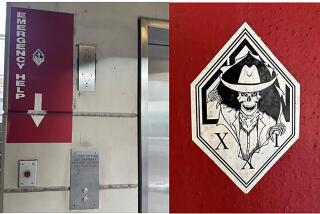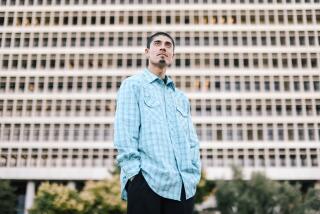A Former Firebrand Lands in Hot Water
- Share via
ATLANTA — Handcuffed, shackled and in the deepest trouble of his life, Islamic community leader Jamil Abdullah Al-Amin--the former 1960s black militant H. Rap Brown, now accused of killing a sheriff’s deputy in Atlanta last Thursday--left an Alabama courthouse under armed guard Tuesday and declared defiantly: “It’s a government conspiracy, man.”
Al-Amin, chased out of rural woods by Alabama prison hounds after five days on the run, denied that he murdered the deputy to avoid arrest on a 1999 theft warrant. His lawyer quoted him as saying he is an innocent man, “lucky to get out of Atlanta with his life.”
Georgia authorities want to extradite the onetime firebrand who has quietly run a mosque and small grocery in Atlanta’s West End since the 1970s. A search of the woods near his capture Tuesday turned up a high-powered .223-caliber rifle that investigators believe is the weapon fired in last week’s shootout.
Al-Amin, 56, was wearing a bulletproof vest when he was caught, allegedly after firing three shots from a shed at U.S. marshals who were searching for him in White Hall, Ala. He was an activist there in the 1960s and had worked in the area more recently, authorities said, carrying the badge of an auxiliary police officer.
Defense lawyer J.L. Chestnut, a veteran of civil rights battles, couched the case in racial terms in speaking with reporters after the Montgomery hearing. He said his client was targeted “because he’s a black man who has been fighting the system all his life.”
On a day when a large crowd mourned Fulton County Sheriff’s Deputy Ricky Kinchen, residents of Al-Amin’s neighborhood digested news of the arrest, second in drama only to last week’s word that he was the sole suspect in the shooting of Kinchen and his partner, Aldranon English, who survived.
They described themselves as divided. Several said they remain suspicious of the police and question whether a man who seemed so outwardly peaceful could have opened fire--when both deputies were African American.
Frank Molden, 64, has watched Al-Amin at close range for years. He said the former Black Panther and chairman of the Student Non-Violent Coordinating Committee should have known enough to accept arrest and not defy an officer carrying a warrant.
William Allen, 58, a Vietnam War veteran who said he endured a tough transition after leaving the military, credits Al-Amin with his positive outlook on life.
Allen and others in the neighborhood said Al-Amin did much to move drug dealers away from West End Park, a quarter-mile-square of rolling green grass, playgrounds and a covered basketball court.
A number of Muslims in the close-knit West End said they had been told not to discuss Al-Amin or their views of him.
As the prayer call sounded at 4 p.m. Tuesday, a woman cloaked in a chador approached a reporter and asked why journalists remained in the neighborhood five days after the shooting.
“He is my husband. It’s very painful to us,” said Cheli Al-Amin before climbing into a sedan. “They’ve already caught him. You just got to let it go.”
More to Read
Sign up for Essential California
The most important California stories and recommendations in your inbox every morning.
You may occasionally receive promotional content from the Los Angeles Times.












